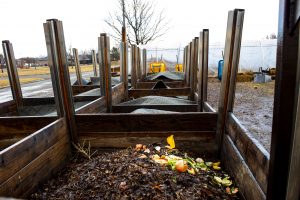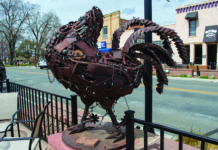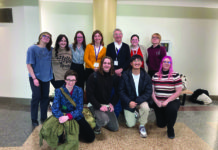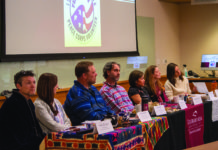As spring begins to arrive in the minds of students of Colorado Mesa University, the Sustainability Council (SC) is busy with many different things, but none of greater immediate concern than composting.

CMU has a compost facility that is separate from the SC, but after this year, they will be merging their budgets.
“Our biggest goal is to integrate sustainability into students everyday life, and show them it’s not just a thing that hipster thing to do; it’s something that’s extremely important for our well being. Composting is an awesome way to integrate that sustainability into life,” Meghan Cline, president of the SC, said.
There are two main types of composting that the SC has been focusing on. The first one, vermicomposting, uses species of worms to break down organic material. The second one, thermophilic composting, uses heat-loving bacteria, thriving in temperatures around 122 Fahrenheit (50 C), in order to accelerate plant molecules.

As vermicomposting is easier at a smaller scale, it is more naturally suited for students and individuals unfamiliar with the topic.
“We want students to know that it’s easy. It’s not gross. Composting is really easy. It’s an essential part of being sustainable,” Cline said.
When asked about what makes a good compost pile, Cline had a few ideas. “Essentially, for your compost, you want a good carbon to nitrogen ratio. You get your carbon from grasses, and your nitrogen source would be food waste. We try to stick to just vegetables, coffee grounds, teabags, eggshells, organic things,” Cline said. Nothing like meat, which will rot.
Basically, the grasses, or carbon, helps with fungal growth within the compost, while food products, or nitrogen, is good for bacterial growth. When testing their compost with EarthFort, a sustainability company based in Oregon, the Council’s compost was deemed practically perfect, able to be used in almost any project.
Cline wants students to know what they can do in order to help with the composting process, even if they’re unfamiliar of the process. “We just want to provide students with the resources when they’re ready to make the change,” Cline said. The SC offers a compost pickup every Monday in the University Center from 1-2 p.m.
“Just giving your apple cores, it doesn’t seem that much, but really, you’re feeding an entire community of microorganisms that are working to break down your food so it doesn’t have to just rot in a plastic bag at the landfill,” Cline said.
In addition to the compost pickup, students can practice vermicomposting even within their

own apartments and residences, by using worms to breakdown paper scraps.
Cline also talks about the benefits that composting has on the soil, and how helpful it is to gardening, including her own garden. She digs trenches in her garden, and puts in compost, enriching the soil through the process.
“I really like tomatoes, so my garden is primarily heirloom tomatoes. It’s awesome to give attention to something and watch it grow and be able to get something from it,” Cline said.

As for the future? The compost facility is working on community outreach, while the SC will be working with the Mesa County Library, who’s working on building a new garden, called Discovery Garden. There, they will give a presentation on composting.
“Composting in general is an awesome way to become more sustainable,” Cline said. Going to the composting pickups on Mondays and buying a couple worms to start vermicomposting are just a few ways that students can help the environment of Colorado Mesa. With spring right around the corner, maybe it’s time to start a garden.






